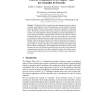69 search results - page 7 / 14 » The Element of Surprise in Timed Games |
JNW
2006
13 years 7 months ago
2006
This paper presents a new approach to integrated security and dependability evaluation, which is based on stochastic modeling techniques. Our proposal aims to provide operational m...
WINE
2010
Springer
13 years 5 months ago
2010
Springer
The Shapley Value is arguably the most important normative solution concept in coalitional games. One of its applications is in the domain of networks, where the Shapley Value is u...
ACII
2007
Springer
14 years 1 months ago
2007
Springer
We analyze the antecedents of affective states in a simulation problem-solving environment, The Incredible Machine: Even More Contraptions, through quantitative field observations ...
STACS
2005
Springer
14 years 28 days ago
2005
Springer
Abstract. We develop for set cover games several general cost-sharing methods that are approximately budget-balanced, core, and/or group-strategyproof. We first study the cost sha...
AAAI
2010
13 years 9 months ago
2010
We consider settings in which voters vote in sequence, each voter knows the votes of the earlier voters and the preferences of the later voters, and voters are strategic. This can...



